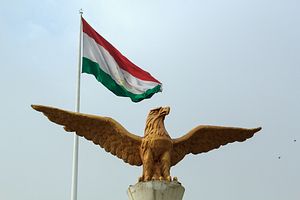This week Iran hosted the 29th Islamic Unity Conference, ostensibly focusing on what the conference categorized as a crisis in the Muslim world and what to do about it. According to the Mehr news agency, the conference was attended by 600 Islamic scholars from Iran and around the world. But one attendee in particular prompted Tajikistan to summon Iran’s ambassador in Dushanbe for a talking-to.
RFE/RL’s Tajik Service reported that Hojjatollah Faghani, Iran’s ambassador to Tajikistan, was summoned so the Tajik government could express its “regret” regarding Tehran’s decision to invite the leader of the Islamic Renaissance Party (IRPT), Muhiddin Kabiri, to the Islamic Unity Conference. Kabiri has been in self-imposed exile for most of the year. His party lost its only two parliamentary seats in the March elections (which were judged unfair by Western observers) and by September the IRPT had been banned and labeled an extremist organization by the government.
Tajikistan maintains that the IRPT — an Islamist political party which sided with opposition factions during the Civil War and was brought into the government as part of the peace process — is a terrorist organization. External observers are hard-pressed to link the party to any acts of violence while the Tajik government claims they were behind the September Nazarzoda mutiny.
A picture from the conference, including in the RFE/RL report, shows Kabiri sitting next to the official Tajik delegation, which included the Tajik Grand Mufti Saidmukarram Abduqodirzoda, the head of the state’s Committee on Religious Affairs, Sulaymon Davlatzoda, and Fayzullo Barotzoda, the director of the Center for Islamic Studies.
A second image, sourced from Iran’s Fars News Agency and republished by Asia-Plus and RFE/RL’s Tajik Service, shows Kabiri and Ayatollah Khamenei face to face.
As reported by Asia-Plus, the Tajik Ministry of Foreign Affairs was unequivocal in its irritation that Iran would invite Kabiri:
Tajikistan’s MFA said in a statement on December 29 that it was “greatly concerned” that “the head of the extremist and terrorist former IRPT, Muhiddin Kabiri, who faces charges of attempting to overthrow the government … has been invited to the conference.”
“Tajikistan’s MFA considers such actions of organizers of this conference to be unacceptable and categorically states that such an attitude to enemies of the state and the people of Tajikistan can negatively affect good relations between Tajikistan and Iran,” the Tajik MFA statement said.
Tajikistan is the only country which lists the IRPT as a terrorist organization. The government has detained most of the party’s leadership, as well as some of their lawyers, and has begun filing official charges.
Iran and Tajikistan have good relations and it’s unclear if this incident will damage them in any lasting fashion. They two countries share linguistic and cultural roots (Tajik is variation of Persian) as well as trade and business ties. As Iran re-enters the global community — contingent on the implementation of the sanctions relief tied to the nuclear deal — that relationship should be set to intensify.
While the final conclusions of the conference follow a familiar Iranian pattern — casting international terrorism as a Zionist and Western plot — they also include condemnations for Nigeria and Azerbaijan for “recent suppression of Muslims.” Such a charge could be levied at Tajikistan as well, where several laws restrict the practice of Islam, particularly when it comes to Islamic dress and involvement of youth in religious activities.
































